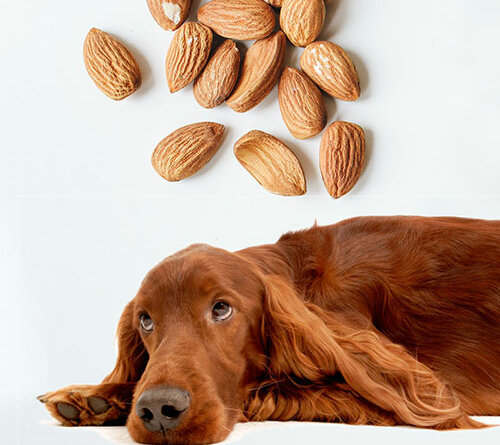Can Dogs Eat Almonds (and Other Nuts)?
Unfortunately, the consensus is probably not. While almonds aren’t necessary toxic, they’re nonetheless candidates for the list of foods it’s best for dogs to avoid (that list also includes walnuts, macadamia nuts, onions, grapes, raisins and chocolate). Even if the almonds in your kitchen are not the seasoned/toasted variety, it’s best to play it safe and not share them with your dog.
While rightfully touted as a healthful alternative for human consumption, almonds pose too many potential safety risks for dogs. These include:
1. Choking hazards. Although in general, dogs are equipped to chew food in much the same way as humans, they don’t “nibble” almonds like we do. They’re more likely to swallow them whole. So there’s a chance that a nut can become lodged in their windpipe; smaller-sized dogs are especially at risk.
2. “Snacking” almonds are often heavily salted and seasoned, which causes us, and definitely our dogs, to become very thirsty (think of those bowls of nuts so many bars generously provide for their customers). Too much salt can lead to water retention, which is especially dangerous for dogs with heart ailments.
GET THE BARK NEWSLETTER IN YOUR INBOX!
Sign up and get the answers to your questions.
3. Almonds are high in fat, which can contribute to a dog developing acute pancreatitis; fat also aggravates chronic pancreatitis.
4. Almonds are high in phosphorus, which can lead to bladder or kidney stones. Some breeds of dogs, such as the Yorkshire Terrier and Lhasa Apso, are genetically predisposed to kidney stones, and Shih Tzu, Miniature Schnauzer and Bichon Frise are prone to bladder stones.
What If Your Dog Eats Almonds?
What you should do depends on the size of the dog and the amount and kind of almonds consumed.
If you think your dog only ate a few almonds and doesn’t appear to be experiencing esophageal obstruction, monitor her for diarrhea or vomiting for 12 hours.
If your dog ate a big bag of almonds—particularly if she’s on the smaller side—take her to the vet immediately. She might require IV fluids for dehydration and drugs for pain management.
Are All Nuts and Nut Butters Bad for Dogs?
You might ask, “My dog loves peanut butter and I give her peanut-butter treats. Are peanuts bad too?” Not necessarily, because peanuts aren’t really a nut, but rather, a legume. Still, it’s best not to give your dog individual peanuts, for many of the same reasons you should avoid giving her other types of nuts.
Another thing to keep in mind. Xylitol, an artificial sweetener, can be found in several brands of peanut butter, and it can cause dogs serious problems, including hypoglycemia, liver disease and blood-clotting disorders. So if you give your dog peanut butter (say, in her Kong), make sure xylitol isn’t one of the ingredients.
The good news is that nut butters, including those made from peanuts and almonds, are extremely easy to whip up at home. If you use organic, unsalted and unseasoned raw peanuts or almonds to make nut butters for yourself (as I do), you can share a tiny amount with your dog with a clear conscience. Just remember that nut butter, while tasty and nutritious, is still high in calories: one tablespoon has 98 kcal. And calories count, both for ourselves and our dogs.





cialis farmacia senza ricetta https://viasenzaricetta.com/#
tor marketplace https://world-dark-market.com/ dark market list
dark web markets dark web market links